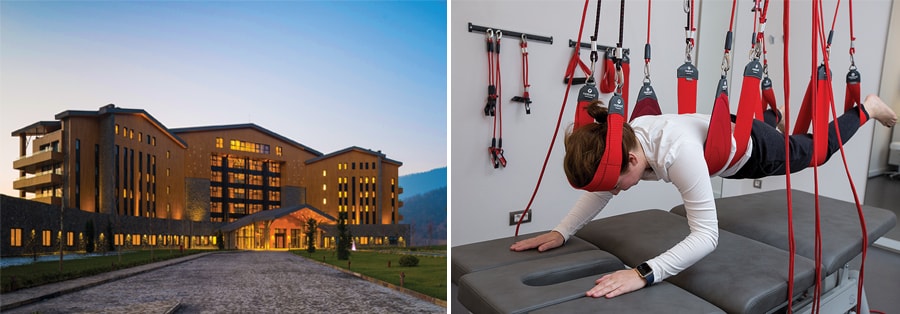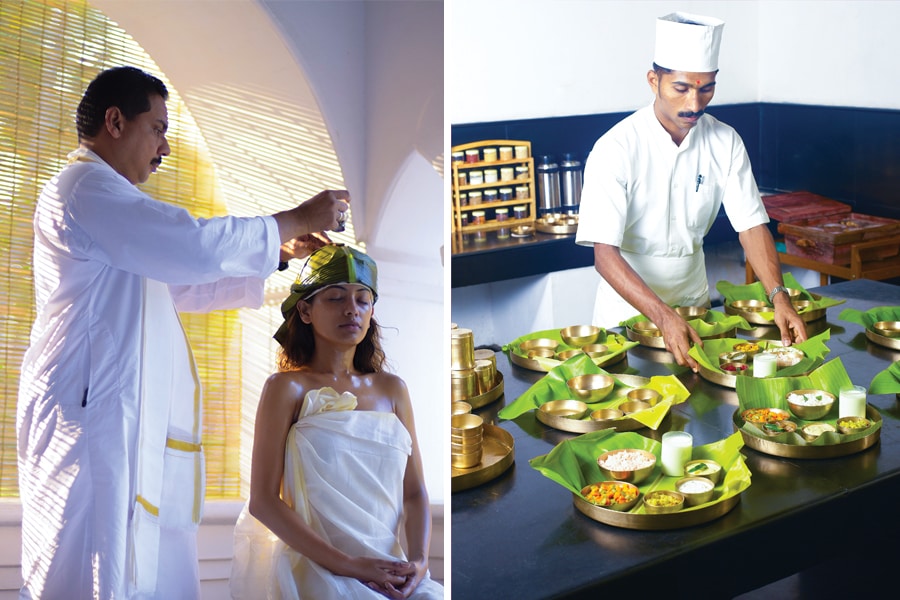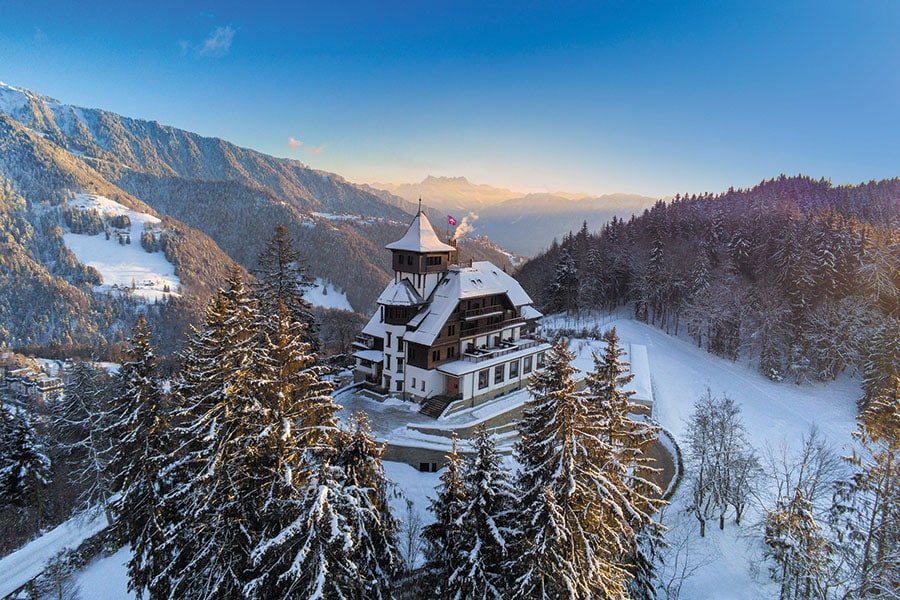While most people take wellness trips to address a particular health issue such as weight management, stress and diabetes among others, there are others, like Cutlerywala, who like to take them as recreational self-care trips. “This was a short trip, but extremely relaxing. My husband and I might look to keep doing one such trip every year," says Cutlerywala, who wanted a break and decided to go on a well-being trip.
According to the Global Wellness Institute (GWI), the Asia-Pacific region has 258 million wellness trips annually, which is second only to Europe. People have been increasingly becoming aware of their well-being and now it is going much beyond spa treatments.
Moreover, Indians have been travelling to countries all over for specific treatments—from South Korea for beauty treatments Bhutan and Nepal for healing certain wellness retreats in Europe for anti-ageing and weight loss, among many others. The India wellness tourism market size is estimated at $19.43 billion in 2024, and is expected to reach $26.55 billion by 2029, with a compound annual growth rate (CAGR) of 6.45 percent between 2024 and 2029, as per Mordor Intelligence.
With more awareness and availability of a range of wellness treatments there is higher demand for concern-specific and well-being programmes. “Earlier, people would look for hotels or resorts with some relaxing spas. Now, people are more focussed on addressing a particular health issue," says Loveleen Arun, founder and director of luxury travel company Panache World.
When a high net-worth individual (HNI) reaches out to travel designers like Arun, “they pick the destination based on the treatment they wish to opt for". For instance, if they are looking for weight management, they might want to look at Austria’s Viva Mayr for detox they might want to go to SHA Wellness in Spain for anti-ageing Chenot Palace Weggis in Switzerland or if it’s an ayurveda-based detox programme, they might look at one of the Six Senses in India or Ananda in the Himalayas. “It all boils down to the purpose of the wellness retreat and how much time and money people are willing to spend," says Arun.
Interestingly, the demand for luxury wellness trips has increased post the Covid-19 pandemic. “Pre-Covid, the focus was on healing from long-term medical issues for which they had not been able to find relief with conventional allopathy medications and treatments," says Sidarth Dominic, CEO of CGH Earth Wellness. “Post-Covid, we have seen a phenomenal increase in Indians seeking holistic health solutions at CGH Earth Wellness—the percentages of Indians were less than 5 percent earlier as compared to the current scenario, where over 30 percent are Indians."
![]() The Chenot Palace Gabala (right) offers a neurac treatment for musculoskeletal pain and neuromuscular dysfunction
The Chenot Palace Gabala (right) offers a neurac treatment for musculoskeletal pain and neuromuscular dysfunction
There is a substantial rise in young Indians who are also seeking preventative wellness programmes. “This boom in luxury wellness comes from the younger generation—people in their late 20s and 30s. They are taking their health very seriously, and doing all that they can to prevent ailments and ageing," says Lavanya Tagra, founder and CEO, Wellnessly, a luxury wellness travel company. “We have been getting queries from youngsters who wish to go for retreats as part of their honeymoon, and even bachelor/bachelorette parties among others."
But why is there a rising focus on wellness now? “There has been a growing recognition of the importance of holistic health, which includes not only physical fitness but also mental and emotional well-being," says Patrick Wilson, founder of Switzerland-based Clinic Les Alpes. “Luxury wellness treatments often offer a range of services designed to address all aspects of health, from physical activities and nutritious dining options to mindfulness practices like yoga and meditation, all in serene and luxurious settings—all of which are customised and personalised."
Wellness and more
While the most popular programmes individuals have been looking for in the recent past are around detox and weight loss, there is an increasing focus on other aspects of health too. “There is a growing focus on achieving the full potential for both mental and physical health and promoting longevity and ageing well, to recover and energise," says private travel designer Amit Kalsi.
Holistic health includes dealing with newer stresses, anxiety and sleep disorders. “We are finding people struggling with diseases such as arthritis, skin issues such as psoriasis, lifestyle and metabolic diseases such as diabetes, hypertension and hypercholesterolemia," says Dominic of CGH Earth Wellness.
With the advent of technology, sleep disorders too are increasing rapidly. “With technology and the blurring lines between work and home life, more individuals are experiencing issues like insomnia and sleep apnea," says Wilson of Clinic Les Alpes. Even with addictions, it’s not only alcohol and drugs, “but also in less commonly addressed areas like technology and gambling," he adds.
![]() (From left) CGH Earth Wellness prescribes individualised health and wellness treatments a chef in Kalari Kovilakom putting together personalised Ayurvedic meals
(From left) CGH Earth Wellness prescribes individualised health and wellness treatments a chef in Kalari Kovilakom putting together personalised Ayurvedic meals
Wellness clinics also cater to issues of substance and behavioural dependency and mental/emotional well-being. Wilson struggled with some such issues for a great part of his life and that led him to set up Clinic Les Alpes in Switzerland. “My vision was to create a clinic that not only operates to the highest clinical standards of Swiss medical licensure, but exceeds them, and works at the forefront of addiction and mental/emotional health practices," he says.
The treatment programme at Clinic Les Alpes includes a full medical screening and psychiatric care throughout a patient’s stay, one-on-one daily sessions with the patient’s dedicated lead therapist, and holistic care, wellness, and nutritional practices. While it is known for its 28-day rehabilitation programme, which is suited for substance and behavioural dependencies and mental/emotional health concerns, “additionally we also offer 2 to 4-week long programmes that address more specific concerns such as burnout, pain management, growth and well-being, and more. And we have a family programme which is designed to help individuals and their families reconnect and support each other in healthy relationships—this is for 6-10 days," says Wilson.
Basis the patient’s needs Clinic Les Alpes tweaks treatment plans—some patients have stayed with them for two weeks, and some for 6 months. Their standard programme costs about 45,000 CHF (approx ₹40 lakh) per week, including treatment and accommodation.
Going the extra mile
Like Clinic Les Alpes there are many other international destinations that are known for their deep focus on certain segments. Some retreats are known for their treatments world over, like Chenot Palace Weggis in Switzerland has the ‘Chenot Method’, based on preventative medicine. Similarly, Viva Mayr in Austria has the ‘Mayr Method’ among others. Chenot Palace Gabala in Azerbaijan also follows the ‘Chenot Method’ of treatments and diet.
“We offer six types of detox programmes minimum for three days and maximum two weeks, such as Fundamental Detox, Advanced Detox, Anti-Age, Anti Stress, Metabolic Optimizing and 3-Day Active Detox programmes. The price range is $4000 (₹3 lakh) to $75,000 (₹62 lakh)," says Rishad Sharifov, general manager, Chenot Palace Gabala.
“The demand for products and services that support healthy ageing and longevity is on the rise, propelled by a shift toward preventive medicine, the growth of health technology (such as telemedicine and digital-health monitoring), and advances in research on anti-aging products," adds Saida Rasulova, head doctor, Chenot Palace Gabala.
![]() View of Clinic Les Alpes in Switzerland
View of Clinic Les Alpes in Switzerland
Travel designer Kalsi says, “Asia has the edge with popular retreats like Chiva-Som Hua Hin in Thailand , The Farm at San Benito in Philippines and Revivo Wellness in Bali, all popular for their holistic approach (mind, body spirit) and specialist therapies like chakra balancing, acupuncture, reiki etc. European retreats, on the other end, are popular with guests due to the use of advanced diagnostic capabilities and equipment."
While there are Indians travelling to various destinations, many international travellers have also been coming to India for ayurveda-based treatments. “Indian retreats should play to their strength—which is ayurveda—instead of including newer treatments," says Tagra.
CGH Earth’s retreats offer authentic ayurveda and naturopathy programmes ranging from 7 days to 14 days with prices ranging from ₹2.1 lakh to ₹6.3 lakh basis the duration and programme picked. While the cost at others, including Six Senses Vana, Six Senses Fort Barwara, Ananda from Himalayas, Shreyas in Bengaluru, ranges upwards of ₹50,000 per night only for stay. The cost per treatment would be additional.
“Each patient gets to spend one-on-one time with doctors during their stay at our retreats. We take the utmost care to ensure there is no dilution of the traditional and classical philosophies with regards to ayurvedic dosha-based cuisine. We also teach our patients how to put together an ayurvedic dosha or naturopathic (raw cuisine) meal, so they can recreate and incorporate them into their daily routine when back home," says Dominic.
Experts also believe HNIs in other Asian countries such as Sri Lanka and the Gulf countries are far more experienced with taking up such wellness treatments as compared to Indians. They are also willing to shell out big bucks on the quality of the treatment, unlike Indians who are far more price conscious. “Most of our Indian clients wish to opt for a trial for three to four nights, before they take on a serious long wellness programme," says Tagra.
However, there is no denying that HNIs are willing to spend lakhs per day and travel miles, if it means they can lose weight or reverse ageing. As these wellness retreats continue innovating treatments, the global wellness market will continue booming.



